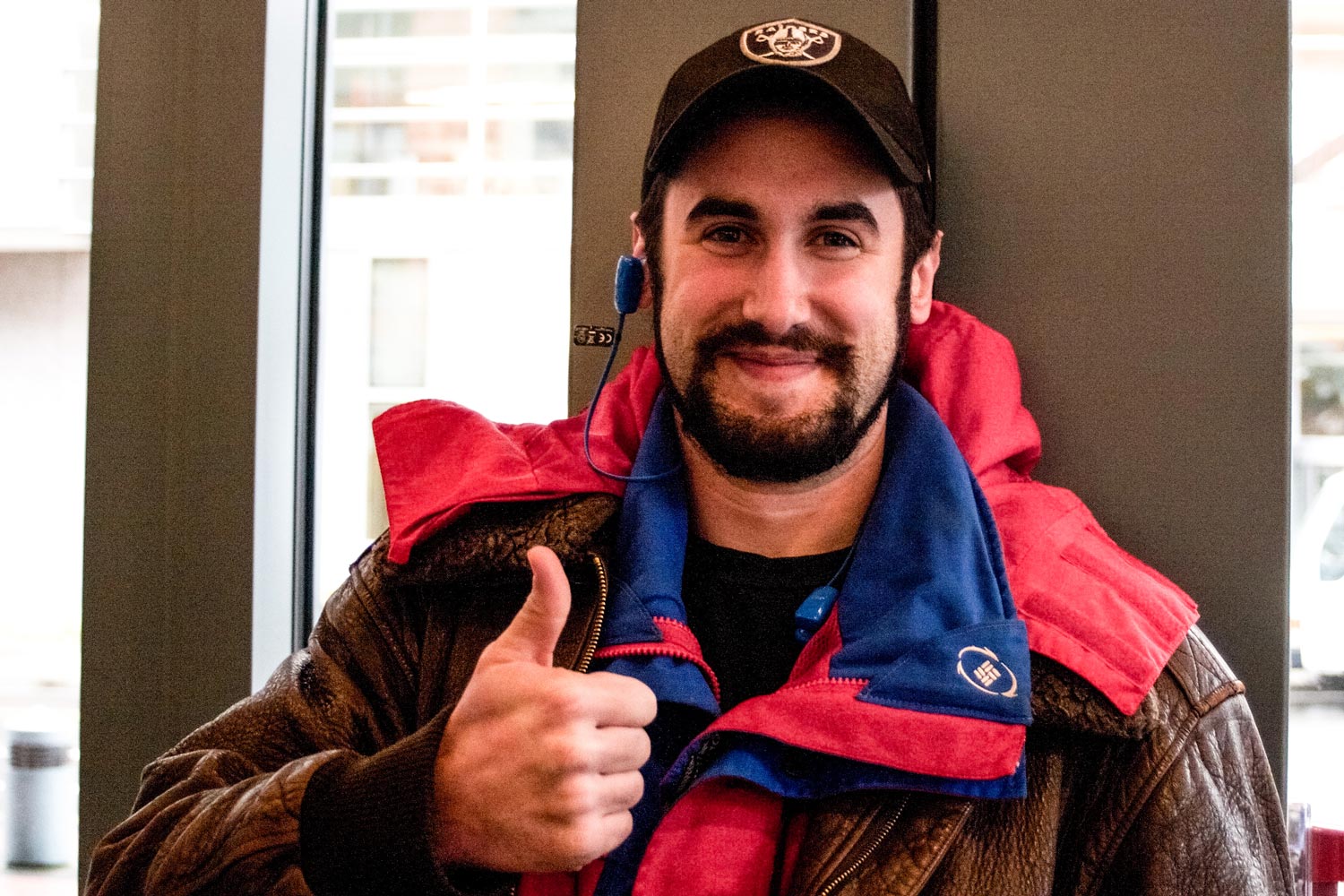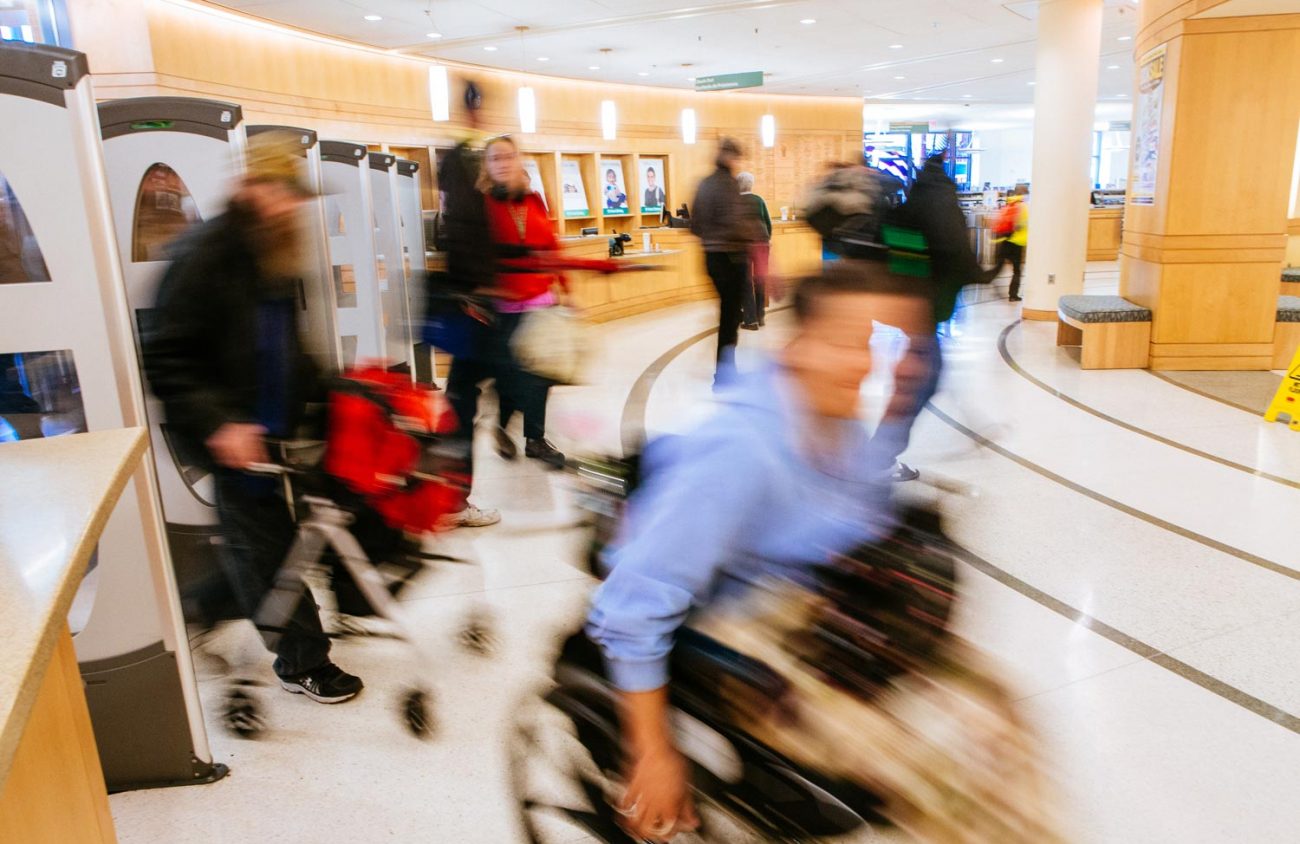It’s ten minutes before the doors open and more than 30 people have gathered in the entry garden of Eugene’s downtown public library. They are reading books, looking at their phones and chatting about movies. Some buy coffee at the Novella Café. They are in wheelchairs, in camo, in beanies. Some carry bags, one has a didgeridoo. There are fathers with babies, retirees, young professionals and sleepy-eyed women carrying crafting supplies.
A number of them are homeless.
When the library doors open nearly 50 people enter, a quiet mass that spreads to every floor, perusing books, heading into story hours for infants or getting online on the many available computers.
Every day nearly 3,000 patrons use the public library system in Eugene, and the vast majority of them come to this downtown location at Olive Street and 10th Avenue.
The Eugene Public Library does not track statistics about its daily users, but it does have a homeless library-card program meant to give the unhoused access to library resources. Instead of providing proof of address to get a library card, the unhoused can bring a letter from a service provider vouching for them.
According to LaVena Nohrenberg, the customer experience manager at library services, two percent of active library cards came from this program, or around 2,000 since the program started 10 years ago.
“I mostly come here to use the wifi or charge my phone,” says Willis Burton, an easygoing young man with dark hair and a baseball cap. He says that the best part about the library is its collection of comic books and graphic novels: “It’s a great collection, and it kind of takes me back to my childhood.”
Burton comes to the library most days from the Eugene Mission. For the homeless, he says, it’s better than spending their last $2 at Starbucks just to access wifi instead of buying food. “I happen to be one of those unhoused currently at the mission, and those $2 are important.”
Enlarge

Photo by Kelly Kenoyer
Burton says the staff has been wonderful to him in his time here, and some security guards are friendly and chat with him. “I’ve been doing a lot of research on the Grand Canyon because I recently got a job with the National Parks Service at the Grand Canyon that starts in May.”
Burton says many unhoused use the library’s resources. “It’s a public library, it’s open to the public, and the unhoused are part of the public.”
Many of the services the library provides to the unhoused are akin those of a day shelter. A roof, electricity and bathrooms are all key features of a suitable shelter for the needy, but the library lacks many of the utilities a homeless person might need in daily life. Resources like laundry, counseling, sleeping facilities and showers aren’t easily available downtown at other public service locations either.
Even if there were a public day shelter, Nohrenberg thinks the library would still serve the homeless population. “My sense is we would still have a role in their life, but they also might have a place to do things during the day that they can’t do here, such as sleeping or eating.”
Library Director Connie Bennett says the library is meant to serve the entire community, not just specific segments. “Traditionally libraries have provided a place of shelter — a place where you can sit down, a place with bathrooms.”
Bennett says certain uses of the library likely come primarily from the unhoused population, such as charging devices, searching for jobs or housing on the computers or engaging in social media online, but she considers all of these to be fair usage.
“If someone is coming here simply to use our library as a day shelter, the only constraint would be that they do it in a way that doesn’t interfere with other people’s use,” Bennett says.
All patrons are required to maintain a certain standard of conduct while they’re in the library. The usual rules apply: no illegal activity, no smoking, no alcohol usage or intoxication.
Patrons must also avoid disruptive behavior, stay awake and are prohibited from using the restrooms to bathe. “The rules are designed to help the place be safe and welcoming to everyone,” Bennett says.
The library is relatively quiet on any given day at any given time, but in the past year there have been 468 calls to the Eugene Police Department from the downtown branch, with complaints ranging from “theft” to “disorderly juveniles” to “criminal trespass.”
The numbers may appear alarming, but Eugene Police Sgt. Julie Smith says, “I don’t think when you look at that number that it’s abnormally large considering how many people come through that area every day.”
Smith points out that the heavily utilized Lane Transit District bus station is right next to the library, and calls for service don’t always lead to arrests. “We have a good relationship with the library and we work in partnership with them.”
Smith says the LTD station downtown may see double that number of calls in a given year. “You’re having a big influx of population coming to a small core area of town, so the library gets used for a multitude of things.”
Rather than focusing on the high volume of calls for service, Smith points to children’s programs at the library in which police officers read to young children. “We’ve created this atmosphere in the library where it’s not ‘Oh, no, there’s a police officer, where’s the emergency?’ It’s ‘I want to be a police officer when I grow up,’” Smith says.
Although librarians and many of the patrons say the library serves the homeless well, some patrons think the usage isn’t appropriate. “I don’t think it’s a good purpose to come charge your phone in the library,” says Orion, a library patron who says he’s currently seeking housing.
Orion, who did not provide his last name, usually comes to use the computers and often stays until afternoon. He thinks fewer people would misuse the library “if there was a place for all the homeless people to go to stay warm and stay out of the rain.”
Library staffer Nohrenberg doesn’t see this use of electricity as a problem. She points out that the library can help the homeless reach a better position in life. “We have books and resources here that will help you get to a different place in your life if that’s what you’re seeking. We also have events that are geared towards getting yourself in a different financial position.”
Bennett says a few patrons have filed complaints, and library foundation members also have raised concerns. “I don’t know how much of it is their own lack of exposure to differences and different people,” she says. “It’s not a whole lot of folks, but we have heard from a few.”
She adds that maintaining behavior standards based on the code of conduct is the best route to keep everyone happy. The library, she says, is “one of the safety-net resources for our whole community.”
The library may serve as a de facto day shelter in downtown Eugene, but that is perfectly in line with the goals of the librarians, staff and security. “When you come here you’re treated exactly the same, and it doesn’t matter where you go at night,” Bennett says.
